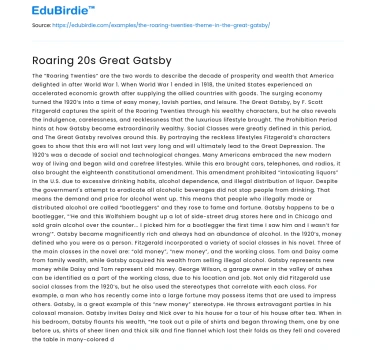The “Roaring Twenties” are the two words to describe the decade of prosperity and wealth that America delighted in after World War 1. When World War 1 ended in 1918, the United States experienced an accelerated economic growth after supplying the allied countries with goods. The surging economy turned the 1920’s into a time of easy money, lavish parties, and leisure. The Great Gatsby, by F. Scott Fitzgerald captures the spirit of the Roaring Twenties through his wealthy characters, but he also reveals the indulgence, carelessness, and recklessness that the luxurious lifestyle brought. The Prohibition Period hints at how Gatsby became extraordinarily wealthy. Social Classes were greatly defined in this period, and The Great Gatsby revolves around this. By portraying the reckless lifestyles Fitzgerald’s characters goes to show that this era will not last very long and will ultimately lead to the Great Depression.
The 1920’s was a decade of social and technological changes. Many Americans embraced the new modern way of living and began wild and carefree lifestyles. While this era brought cars, telephones, and radios, it also brought the eighteenth constitutional amendment. This amendment prohibited “intoxicating liquors” in the U.S. due to excessive drinking habits, alcohol dependence, and illegal distribution of liquor. Despite the government's attempt to eradicate all alcoholic beverages did not stop people from drinking. That means the demand and price for alcohol went up. This means that people who illegally made or distributed alcohol are called “bootleggers” and they rose to fame and fortune. Gatsby happens to be a bootlegger, “‘He and this Wolfshiem bought up a lot of side-street drug stores here and in Chicago and sold grain alcohol over the counter... I picked him for a bootlegger the first time I saw him and I wasn’t far wrong’”. Gatsby became magnificently rich and always had an abundance of alcohol.
Save your time!
We can take care of your essay
- Proper editing and formatting
- Free revision, title page, and bibliography
- Flexible prices and money-back guarantee
In the 1920’s, money defined who you were as a person. Fitzgerald incorporated a variety of social classes in his novel. Three of the main classes in the novel are: “old money”, “new money”, and the working class. Tom and Daisy came from family wealth, while Gatsby acquired his wealth from selling illegal alcohol. Gatsby represents new money while Daisy and Tom represent old money. George Wilson, a garage owner in the valley of ashes can be identified as a part of the working class, due to his location and job. Not only did Fitzgerald use social classes from the 1920’s, but he also used the stereotypes that correlate with each class. For example, a man who has recently come into a large fortune may possess items that are used to impress others. Gatsby, is a great example of this “new money” stereotype. He throws extravagant parties in his colossal mansion. Gatsby invites Daisy and Nick over to his house for a tour of his house after tea. When in his bedroom, Gatsby flaunts his wealth, “He took out a pile of shirts and began throwing them, one by one before us, shirts of sheer linen and thick silk and fine flannel which lost their folds as they fell and covered the table in many-colored disarray”. Gatsby uses his delicate shirts to show off his fortune to Daisy and attempt to win her over again. Additionally, despite Gatsby’s incredible fortune, he lives in West Egg, implying that no matter how many colored shirts or off the hook parties he hosted, he could never ascend to Daisy’s social class. Daisy and Tom equally portray their “old money” stereotype. The “old money” stereotype often depicts a person who believes themselves superior to others, thus entitled to whatever and inconsiderate of others. After the Buchanan’s do not show up to Gatsby’s funeral, Nick characterizes them as, “They were careless people, Tom and Daisy—they smashed up things and creatures and then retreated back into their money or their vast carelessness, or whatever it was that kept them together, and let other people clean up the mess they had made….”. Tom and Daisy were used to having money to fix their problems, so when the incident with Myrtle happened they both ran away. Daisy especially uses her wealth as a security blanket throughout the book. For example, sparknotes says, “Nick characterizes her as a careless person who smashes things up and then retreats behind her money. Daisy proves her real nature when she chooses Tom over Gatsby in Chapter 7, then allows Gatsby to take the blame for killing Myrtle Wilson even though she herself was driving the car” (Sparknotes). Daisy’s up bringing in an “old money” lifestyle has led her to become one of the most selfish characters in the novel. She’s only worried for herself, which is why she drives away from Myrtle after hitting her and returning to Tom after finding about Gatsby’s real claim to fortune. Ultimately, this shows that the wealthy are above the law and are able to avoid the consequences.
The American Dream was romanticized during the 1920’s but Fitzgerald predicted that it wouldn’t last. By depicting the protagonists irresponsible habits throughout the novel, the audience can conclude that the Roaring Twenties will not last long and ultimately lead to the Great Depression.






 Stuck on your essay?
Stuck on your essay?

